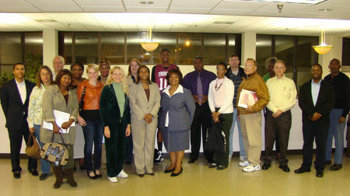Citizens Academies
About Citizens Academies
A citizens academy (also known as a city/county 101 program or neighborhood college) is, usually, a seven-to-eight week program where 20-25 residents are given the opportunity to meet with various local government staff and elected leaders and gain insight into local government services and operations.
There is variation from this typical model; each section within the Component Guide page profiles some differences.
Unlike citizen police and fire academies, the citizens academy looks comprehensively at the role and structure of local government in the community, which may include public safety.
Alumni often become informal ambassadors for the local government, share information with their neighborhoods, and often go on to serve on advisory boards. Some even run for elected office.

Participants from Fayetteville, NC, Citizens' Academy
Program Goals
Reasons for creating and sustaining a citizens academy vary from community to community. However, three broad goals are present in most programs.
- Knowledge: Improving citizens' understanding of local government while learning more about community issues and concerns.
- Citizens get a hands-on and behind-the-scenes look at how services and programs are provided.
- Citizens better understand what is needed to run a municipality or county.
- Staff members hear directly from citizens about the realities of programs and operations.
- Staff members have the chance to hone their presentation skills.
City of Fayetteville, NC: “The academy gives citizens a better understanding of what city departments do and how their functions affect quality of life issues.”
- Involvement: Improving the quality and quantity of citizen participation in local government.
- Citizens learn how they can be more involved.
- Many citizens go on to become volunteers, including service on an appointed advisory board or committee.
Town of Aberdeen, NC: “The program will help teach and cultivate new community leaders and help move those new leaders into important positions within the community.”
City of Lauderdale Lakes, FL: “Participants will [g]ain knowledge to become effective leaders and serve as role models in their neighborhoods.”
- Public Relations: Improving the lines of communication and relationship between citizens and their local government.
- Citizens have the opportunity to connect with other citizens.
- Citizens and staff create relationships that foster enhanced communication.
- Alumni become informal ambassadors for the local government.
City of Winterville, NC: “Informed citizens will foster stronger working relationships between government and the community it serves.”


